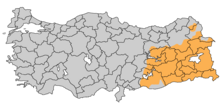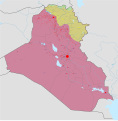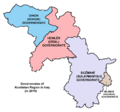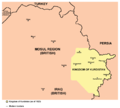The Kurdistan Portal Kurdistan (Kurdish: کوردستان, romanized: Kurdistan, lit. 'land of the Kurds'; [ˌkʊɾdɪˈstɑːn] ), or Greater Kurdistan, is a roughly defined geo-cultural region in West Asia wherein the Kurds form a prominent majority population and the Kurdish culture, languages, and national identity have historically been based. Geographically, Kurdistan roughly encompasses the northwestern Zagros and the eastern Taurus mountain ranges. Kurdistan generally comprises the following four regions: southeastern Turkey (Northern Kurdistan), northern Iraq (Southern Kurdistan), northwestern Iran (Eastern Kurdistan), and northern Syria (Western Kurdistan). Some definitions also include parts of southern Transcaucasia. Certain Kurdish nationalist organizations seek to create an independent nation state consisting of some or all of these areas with a Kurdish majority, while others campaign for greater autonomy within the existing national boundaries. The delineation of the region remains disputed and varied, with some maps greatly exaggerating its boundaries. Historically, the word "Kurdistan" is first attested in 11th century Seljuk chronicles. Many disparate Kurdish dynasties, emirates, principalities, and chiefdoms were established from the 8th to 19th centuries. Administratively, the 20th century saw the establishment of the short-lived areas of the Kurdish state (1918–1919), Kingdom of Kurdistan (1921–1924), Kurdistansky Uyezd i.e. "Red Kurdistan" (1923–1929), Republic of Ararat (1927–1930), and Republic of Mahabad (1946). Iraqi Kurdistan first gained autonomous status in a 1970 agreement with the Iraqi government, and its status was re-confirmed as the autonomous Kurdistan Region within the federal Iraqi republic in 2005. There is also a Kurdistan Province in Iran, which is not self-ruled. Kurds fighting in the Syrian Civil War were able to take control of large sections of northern Syria and establish self-governing regions in an Autonomous Administration of North and East Syria (commonly called Rojava), where they seek autonomy in a federal Syria after the war. (Full article...) Selected article -The Kurds are the largest ethnic minority in Turkey. According to various estimates, they compose between 15% and 20% of the population of Turkey. There are Kurds living in various provinces of Turkey, but they are primarily concentrated in the east and southeast of the country within the region viewed by Kurds as Turkish Kurdistan. During the violent suppressions of numerous Kurdish rebellions since the establishment of the Republic of Turkey in 1923, such as the Sheikh Said Rebellion, the Ararat rebellion, and the Dersim Rebellion, massacres have periodically been committed against the Kurds, with one prominent incident being the Zilan Massacre. The Turkish government categorized Kurds as "Mountain Turks" until 1991, and denied the existence of Kurds. The words "Kurds" or "Kurdistan" were banned in any language by the Turkish government, though "Kurdish" was allowed in census reports. Following the military coup of 1980, the Kurdish languages were officially prohibited in public and private life. Many people who spoke, published, or sang in Kurdish were arrested and imprisoned. In Turkey, it is illegal to use Kurdish as a language of instruction in both public and private schools. The Kurdish language is only allowed as a subject in some schools. (Full article...) General images -The following are images from various Kurdistan-related articles on Wikipedia.
Related portals'Religions in Kurdistan Arab states Other countries Selected picture Iraqi Kurdish smugglers near the Iraq-Iran border
Did you know
CategoriesTopicsNew articlesThis list was generated from these rules. Questions and feedback are always welcome! The search is being run daily with the most recent ~14 days of results. Note: Some articles may not be relevant to this project.
Rules | Match log | Results page (for watching) | Last updated: 2024-11-20 21:20 (UTC) Note: The list display can now be customized by each user. See List display personalization for details.
Things you can do
Associated WikimediaThe following Wikimedia Foundation sister projects provide more on this subject:
Sources
Discover Wikipedia using portals |









































